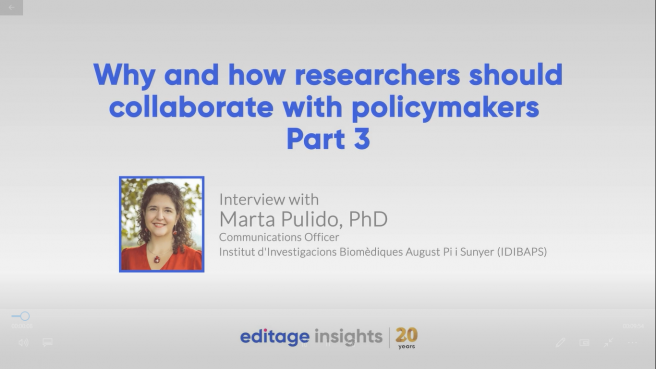Why and how researchers should collaborate with policymakers: Interview with Marta Pulido (Part 3)
Researchers worldwide are often needed to communicate the relevance of their work to policymakers. While this area of work has much in common with communicating science to the general population, there are important differences. Policy-related communication involves collaborating with policymakers and not just talking at them: it is a two-way interaction with shared goals, a common language, and shorter timelines than researchers are typically used to.
If you are a researcher whose work can directly inform policies, collaboration with policymakers need not be necessity-driven and something you do only when asked to. You can actively seek out opportunities to do so. In this 3-part interview series, Marta Pulido, Communications Officer at Institut d’Investigacions Biomèdiques August Pi i Sunyer (IDIBAPS) talks about the benefits of doing this type of work (for yourself and for the wider society), which skills you need, and how best to prepare yourself.
This video is the last of a 3-part interview series focusing on what researchers need to know about communicating with policymakers. The host, Mriganka Awati (Senior Writer, CACTUS) is in conversation with Marta Pulido, a scientist by training and a science communicator at Institut d’Investigacions Biomèdiques August Pi i Sunyer (IDIBAPS).
In the first and second segments of the interview, Marta talked about the skills needed to communicate with policymakers, common perceptions that scientists and policymakers may have about each other, and her observations of how collaborations between scientists and policymakers can differ across regions depending on the socio-political and cultural contexts.
In this third segment, Marta shares thoughts on how you can prepare yourself for collaborations with policymakers so that you understand the context and timelines for policy-related work better. She also discusses examples of successful collaborations between scientists and policymakers, and shares words of encouragement and advice for scientists engaging in policy-related work.
[VIDEO TRANSCRIPT]
Mriganka: So, you know, in addition to science, communication skills, and what you said, listening, you know, what kind of preparation would a scientist need to do? Because, like you said, they need to also be aware of the context in which they will be working. You know, they need to be aware of the policy frameworks, about, you know, everything else, like you said, changes in government, or you know, how fast—just the timelines, that scientific projects and policymaking, they are happening on two different timelines. So, with all of that in mind, you know, what are some of the, like, how best can scientists prepare themselves to do this kind of work? Because, so that they don't—they find themselves engaged in it rather than feeling frustrated? So, what would you, what advice would you give them?
Marta: Yeah, it’s very easy to get frustrated. So, I will ask for scientists to be resilient. And don't be like, try, try it again. Of course, not that you don’t have to spend years and years to stretching yourself, because it's pointless. But don’t give up the first obstacle that you face.
I will recommend because I, myself, I didn’t have the opportunity to do it. But I have known other scientists that have been involved in this kind of programs. And they told me that it’s very useful, if you have the opportunity, to get to the, you know, to, for instance, in Europe, there are some trainings that you can go to the European Parliament, and to spend like three or six months or maybe a year, working hand-to-hand with policymakers on their daily day. So, it’s very useful to get this image of the time span.
But this kind of— um, how to say—of meetings, this dynamic of how they meet, how they work, how they think, how they, well, how all the similarity to have the big picture of policy. Because when you have some trainings, outside parliaments or in embassies, of course, trainers can explain you a little bit how the policy maker works, and diplomats and so on, but it’s very useful to see by yourself.
And I know that there are some countries that have these programs in embassies and parliaments. So, if you identify in your country, this kind of programs, I will encourage people—scientists—to apply. Because, you know, I think that it’s not very, very long programs like three or six months, but it’s enough for you to realise what’s going on, and also, to identify the skills that you may need to pursue a career and to be successful in engaging with policymakers.
Mriganka: Do you know of…can you maybe give an example of a case where, you know, collaboration between a scientist and policymakers were like a successful collaboration between scientists and policymakers that led to some positive changes. Either, not specifically to, not specific to Latin America—maybe Latin America, if you are familiar with any—but in general, as well.
Marta: Well, if you just go to some bibliography there are some success cases. I will talk about the Spanish case during the pandemic. It was very, very interesting to see how groups of scientists organised with policymakers. I don’t know, because it depends when you talk with one part or the other. But I would say that at the end, maybe not 100%, but it was a very interesting success, in the point that here in Spain, before the pandemic, it was very difficult for scientists to sit together with policymakers. And so, at least we tried, and we, I think that we succeed, with some recommendations that were advice for scientists.
So, scientists had the opportunity to go to policymakers with scientific data, and it was something that was happening very, very, very fast, because we were getting data about the pandemic, like, every day we have new insights and new results and new clues about what was going on, not just in Spain, but all around the world. So, although you have this part that when scientists meet with the government, and then the government go to the parliament with the other political groups to speak, and at the end, well, maybe the law gets approved or not.
But I have talked with some of the scientists that have been involved in this process. And they told me that it was very interesting that they, they feel that policymakers were really, really into this, the point that to try to really engage with scientists, get their science data, and at the end, try to benefit the society with data on hand, not just, you know, with any other evidence; at least, to have this policy evidence on the, on the table, no.
The other point was that at the end, maybe the law was successful or no, but they were very—the scientists were very satisfied that at least they tried. That was something that well, I don’t know what to say, that never happened before. But, if not, never, in a very, very few occasions, so…and then that another point that the—now here in Spain, we have a group of scientists, a permanent group of scientists, that is working with policymakers in the Parliament. And it was an initiative that began I think that sometime before the pandemic, but was like, stop with the change of the government. And then with the new government, it was reactivated again. And also, with the pandemic, that was quite evident that this group of scientists was necessary to have an office. Indeed, they have an office, there’s a Science Office in the Parliament, which is, well, it’s a success!
Now, we will see if, what, and how many initiatives go to the end of the of the way. But I think that it’s very interesting to bear in mind that it’s possible. It’s possible to get solutions, and to get to the end, and be successful. It’s not easy, as many, many things in this world. But it’s very important.
I was talking with a scientist in Latin America, yeah, I think that he was from Chile. And he told me that back in the, I think it was in the in the 80s, he was involved in all the process that Chile, finally get involved in the protection of Antarctica. And he told me that he’s experienced in talking with policymakers and the frustration. The frustration he was feeling like, because he thought that it will be, at the end, pointless and unsuccessful and all. But they manage at the end to get conscious between policymakers and the importance to protect Antarctica, and that Chile get involved in this. It was an international effort. So yeah, there are examples of success. And it’s very important to work to have more examples.
Mriganka: I think this was very, very interesting. So, thank you, Marta. It’s been such a pleasure talking to you. And I’m sure your perspectives, and the tips that you’ve shared, will be very helpful to researchers, both in you know, expanding their view on what’s possible for them to do within their career, and in terms of how they can contribute to, you know, something more than the scientific advancement of their fields. So, this was very helpful. Thank you so much.
Marta: It was a pleasure too, and I would just say that it’s possible. Just keep in mind this: that maybe you think but I’m a small person in the world, I have no power. Just try it. And another point: if you’re afraid to get just like out of science and well, try to do what I made like part-time in science and part-time in this other path and just try to well, what of the sides at the end goes a reality, and something that really do you really gets passionate about.
Mriganka: Right. It’s very inspiring. Thank you. Thank you so much once again.
Marta: Thank you to you, and it was a pleasure.
You're looking to give wings to your academic career and publication journey. We like that!
Why don't we give you complete access! Create a free account and get unlimited access to all resources & a vibrant researcher community.

This content belongs to the Career Growth Stage





View Comments